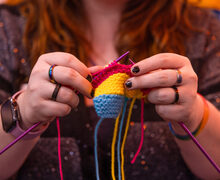Banned Books Read-Out combats literary censorship
Alexander Zhiltsov | Contributing Photographer
Speakers had the option of reading from either a book they brought to the event or one of the banned books provided. Students passing by the event stopped to participate and read a passage for the crowd.
Get the latest Syracuse news delivered right to your inbox.
Subscribe to our newsletter here.
When Syracuse University librarian Patty Giles was 11, her mother discovered that she was reading the controversial novel “Are You There God? It’s Me, Margaret.” by Judy Blume and burned Giles’ copy in their woodstove.
Last year, Giles had the opportunity to read passages from that same book aloud at Bird Library’s first Banned Book Read-Out. This year, she helped organize the event.
“As people that work in an educational institution, we have an educational obligation … to make (the SU community) aware of these efforts to ban books and challenge books,” Giles said. “To provide support for the libraries in their towns and cities and their public schools.”
In honor of Banned Books Week, a national event organized by the American Library Association, Bird Library hosted its second annual Banned Book Read-Out this Wednesday. The event provides books that have been challenged or banned in certain parts of the United States for visitors to read.
The readings took place near Bird Library’s main entrance, drawing students’ attention midway through the event. Some joined the audience seated in front of the main podium.
Attached to the event was a book display, with statistics and information about the books and book bans. It directed viewers to a QR code for a LibGuide where guests can find resources for educators and history about book bans.
The event was put on in collaboration with the Department of English and various on-campus sponsors, said Abby Kasowitz-Scheer, the head of the department of Learning and Academic Engagement. After a higher turnout than last year, they’ve extended the period of time where visitors can read passages for this event.
“It’s a celebration of the freedom to read,” Kasowitz-Scheer said. “Having access to different kinds of books about all different kinds of people and experiences.”
Professor Roy Gutterman helped organize the event through his position at the Tully Center for Free Speech in Newhouse. Censorship is a key issue for free speech, so he encourages events such as these on campus because they raise awareness for the community.
He said that the location of the event, in the center of Bird, gives students the opportunity to interact with the body of knowledge the library contains. He enjoys hearing the work that is chosen and watching students participate along with English professors and librarians.
“It’sAbby Kasowitz-Scheer
“(The event) lets people know that just because we’re in a nice comfortable campus in upstate New York, it doesn’t mean that we’re not immune or isolated from these types of censorship issues,” Gutterman said.
Using a recent incident with a student’s speech in Tully, N.Y., Gutterman mentioned in his speech that censorship issues are becoming more prevalent. The student wrote a “senior spotlight” for his school newspaper about his experience coming out, and the principal vetoed it.
Kasowitz-Scheer said that although the Syracuse community is not facing many bans and challenges, the event aims to support those that are experiencing challenges more directly.
“Part of the danger of book banning is people are trying to take away access to information about people’s real, lived experiences,” Kasowitz-Scheer said. “That’s part of what we’re trying to do here is just show how important it is to provide access to all kinds of books.
Giles said that over the last few years, there has been a notable increase in the number of book bans and restrictions. In 2021, the number of challenged books jumped from 223 to 1,858, then to 2,571 the next year, she said.
One theory for why this may be taking place is there has been an increase in the number of books being published about gender, sexuality, race and religion, Giles said. These books are the ones facing consistent bans in certain communities.
Anastasia Powell, a creative writing senior, said books are a way to experience what others have lived through. She stopped by the event to show support for the creative writing program and read a passage from “Giovanni’s Room” by James Baldwin.
Events like these garner a sense of community between the programs organizing the event, such as the creative writing department and the English department, she said. Besides encouraging community, the event brings awareness to an issue that uniquely affects writers and those in similar fields.
“(Books) are not only a form of entertainment, but they’re also pathways to what the past is like, what other time periods are like,” Powell said. “They offer a lot of insight to different perspectives … making somebody more aware of the world that we live in.”
Published on October 4, 2023 at 9:47 pm






